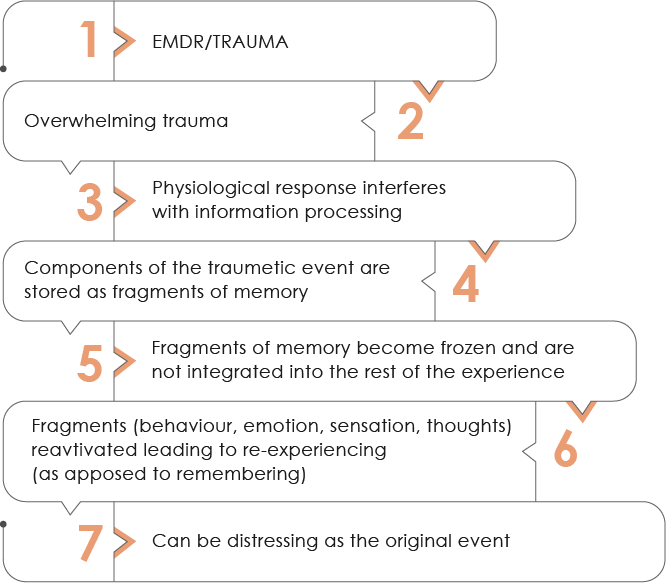What is EMDR?
Eye Movement Desensitisation and Reprocessing (EMDR) is an innovative and scientifically proven therapy designed to help individuals process unresolved trauma and distressing memories. Unlike traditional talk therapies, EMDR focuses on reactivating your brain’s natural healing mechanisms, enabling you to move forward with greater clarity and peace.
Why Choose EMDR?
Trauma can affect anyone—whether it stems from a specific event like an accident or a longer-term experience such as childhood adversity. EMDR is a powerful tool for processing these experiences and breaking free from the hold they may have on your thoughts, emotions, and behaviors.
Some common challenges EMDR can help address include:
- Post-traumatic stress disorder (PTSD)
- Anxiety and panic attacks
- Grief and loss
- Phobias
- Depression
- Low self-esteem
If you’ve been feeling stuck or overwhelmed by painful memories, EMDR might be the approach you’ve been searching for.

What Happens During EMDR Therapy?
During EMDR therapy, you’ll work closely with a skilled therapist who will typically guide you through an eight-phase process designed to ensure your safety, comfort, and success. Here’s what typically happens:
How Does EMDR Therapy Work?
EMDR therapy is structured yet flexible, ensuring that each session is tailored to your individual needs. Here’s a closer look at the process:
1. Initial Consultation and Preparation
During the initial sessions, you’ll meet with your therapist to discuss your history, concerns, and goals. This is a time to build trust and prepare for the therapy process. Your therapist will also teach you techniques to manage stress and regulate your emotions during and between sessions.
2. Identifying Target Memories
Together with your therapist, you’ll identify specific memories or issues that are causing distress. These might include traumatic events, recurring negative thoughts, or even physical sensations linked to emotional pain.
3. Bilateral Stimulation
This is the core of EMDR therapy. Using guided eye movements, tapping, or auditory tones, your therapist will help activate both sides of your brain. This bilateral stimulation encourages the brain to reprocess distressing memories, reducing their emotional intensity and integrating them into your broader life narrative.
4. Reprocessing and Reintegration
As the sessions progress, you’ll find that once-painful memories begin to lose their hold over you. Instead of triggering strong emotional reactions, these memories become neutral or even empowering. You’ll start to experience greater resilience and a renewed sense of control over your life.
Imagine sitting in a comfortable and supportive environment, guided by a compassionate therapist who helps you gently untangle the knots of past trauma. Each session brings you closer to emotional freedom and self-discovery.
The Benefits of EMDR
The transformative effects of EMDR extend far beyond simply reducing symptoms. Here are some of the key benefits you may experience:
Who Can Benefit from EMDR Therapy?
EMDR is suitable for a wide range of people, regardless of age or background. It has been shown to be particularly effective for:
Individuals recovering from a single traumatic event, such as an accident or assault: EMDR helps reprocess the trauma so that it no longer triggers intense emotional reactions, allowing individuals to move forward with a sense of safety and control.
People dealing with long-term emotional challenges like anxiety or depression: By addressing the root causes of these issues, EMDR reduces distressing symptoms and fosters healthier emotional responses.
Those struggling with phobias or performance-related stress: EMDR can desensitise individuals to their triggers, enabling them to approach previously overwhelming situations with confidence.
Survivors of abuse or neglect: EMDR works to heal deep-seated wounds by reframing negative self-beliefs and fostering self-compassion and empowerment.
Anyone looking to process unresolved grief or loss: EMDR provides a safe space to explore painful memories, helping individuals find peace and acceptance while honouring their experiences.
Even if you’re unsure whether your experiences qualify as “trauma,” EMDR can still be beneficial. Many clients report improved emotional regulation, greater self-awareness, and enhanced overall well-being after completing therapy.
What to Expect During Your EMDR Journey
Each person’s journey through EMDR is unique, but most clients find the process to be deeply transformative. Sessions typically last 60 to 90 minutes and are spaced out according to your needs. While some individuals notice significant changes after just a few sessions, others may benefit from a longer course of therapy.
At IC Therapies, we take the time to ensure you feel safe, supported, and empowered throughout your healing journey. Your therapist will be there every step of the way, offering guidance, encouragement, and expertise.
Why Choose IC Therapies for EMDR in Kent?
At IC Therapies, we pride ourselves on providing a warm, welcoming environment where your well-being is our top priority. Here’s what sets us apart:
- Experienced Therapists: Our team is highly trained in EMDR techniques and committed to your success.
- Personalised Care: We tailor every aspect of therapy to meet your individual needs and goals.
- Convenient Location: Based in Maidstone, we’re easily accessible to clients across Kent.
- Compassionate Approach: We understand the courage it takes to seek help and strive to make every step of the process as comfortable as possible.
Take the First Step Towards Healing
If you’re considering EMDR therapy, we invite you to take the first step today. Our team at IC Therapies is here to answer your questions, address any concerns, and help you embark on a path to healing and renewal.
Contact us today to schedule a consultation and find out how EMDR therapy in Kent can transform your life. Let’s work together to unlock the resilience and strength within you, paving the way for a brighter, more empowered future.
EMDR Case Study
(Warning some people may find this example distressing)
“Mark” (a pseudonym) is a 29-year-old security professional who sought therapy after experiencing a traumatic incident at his workplace. The event occurred when his workplace was violently robbed by a group of armed men wearing hoods. The gang burst in, shouting threats and warning they would shoot anyone who made a move. Mark was terrified, feeling that he had narrowly escaped death simply for showing up to work. Following the robbery, he decided not to return to his job, deeming it too dangerous. He became isolated, withdrawing from his social circle and family. He described feeling as though his world had been destroyed and expressed deep guilt for having hidden to protect his life during the attack. The sounds of the shouting, screaming, and gunfire echoed in his mind long after the event.
Mark’s symptoms included intrusive memories, flashbacks, recurring nightmares, heightened startle responses, and a pervasive sense that his life was over. He reported feelings of intense anxiety and depression, alongside struggles with sleep and chronic exhaustion. The impact on his personal life was significant; his marriage was strained, and his libido had diminished, creating challenges in his intimate relationship. He also distanced himself from his two young children, no longer spending time with them.
In therapy, we introduced Mark to Eye Movement Desensitization and Reprocessing (EMDR) treatment. We explained how the distressing memory of the robbery had been maladaptively stored in his mind, leading to ongoing emotional pain and disruption. EMDR therapy was outlined as a way to help him reprocess this memory, allowing it to be stored in a less distressing and more adaptive manner.
After completing 12 sessions of EMDR, Mark reported a marked improvement in his emotional well-being. The once-disturbing memories of the robbery no longer troubled him. He experienced better sleep, increased energy, and a significant lift in his overall mood. His relationship with his wife began to improve, and he started reconnecting with a few close friends. By the conclusion of his treatment, Mark felt ready to pursue training for a new career in marketing, embracing the next chapter of his life with renewed hope and confidence.




